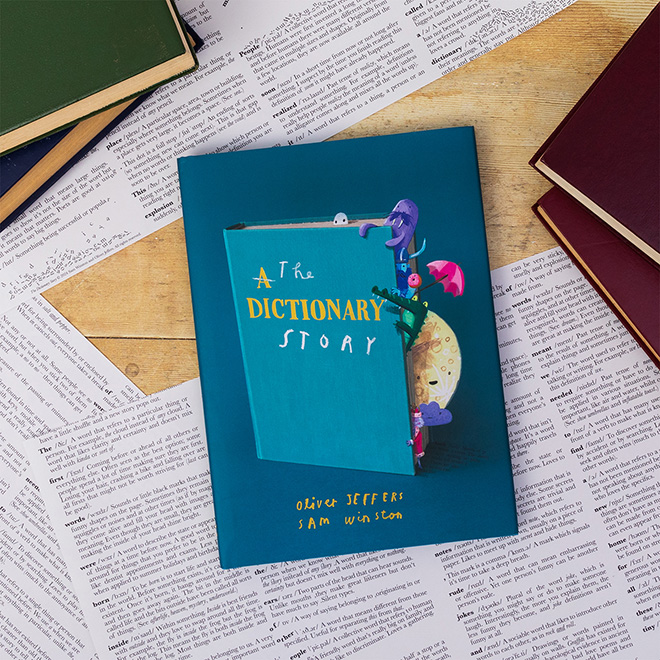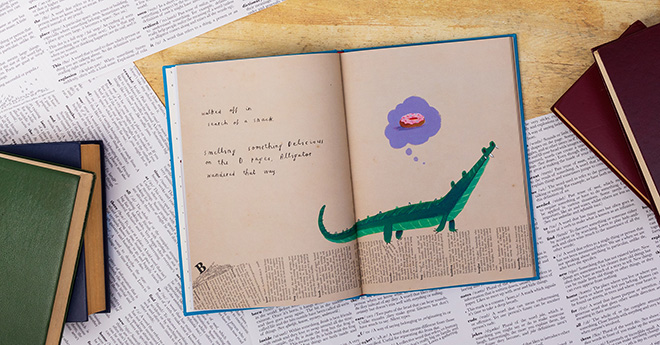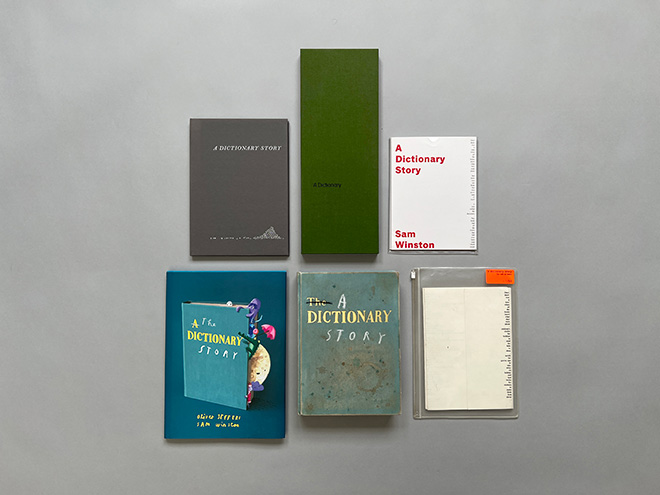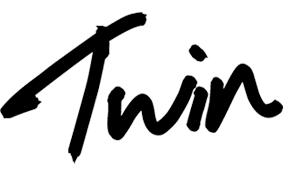
Photo by Walker Books.
Twenty years ago, artist Sam Winston discovered a room of unused words in the Oxford University Press (home of the Oxford English Dictionary). Penny Silva, Dictionary director at the time, gave Sam a tour, “she was showing me around when she took me into a small room full of index cards and declared… ‘this is the room where all the words that aren’t in The Dictionary are kept’.” Since that first spark of interest in 2004, Winston has gone on to create exhibitions and artworks inspired by this unseen words room and the creative potential of the dictionary.
This unique linguistic inspiration now forms the spine of a lyrical picture book created in collaboration with New York Times best-selling author-illustrator Oliver Jeffers. A call to kids and adults alike to create, to question, to explore, and to imagine, their magical project is intended to prompt young readers to ignite their love of language and discover where their words come from, and how we all have a story to tell.

Photo by Walker Books.
In 2007 words like almond, blackberry and crocus in the Oxford Junior Dictionary made way for block graph and celebrity. In 2012 the edition maintained those changes, and further removed catkin, cauliflower, chestnut and clover, and now instead features cut and paste, broadband and analogue. The authors noted a pattern in which the natural world and external play-based childhood inferences are being replaced with internal, digital and sedentary past-times.
Winstone reflects, “It’s a book that I wish I had as a kid. When I was young I didn’t understand words, my imagination was crazy and reading seemed like torture. This book is for that person. I hope it inspires a reluctant reader to pick up a book and smile. Because when someone realises how powerful the spell of words can be, a new world of opportunities opens up for them.”
Definitions
ghost /ɡəʊst/ Believed to be the spirit of someone who is no longer in this world. Ghosts can appear as shadows, strange shapes or just silly people with bedsheets over their heads. They sometimes scare people, which means it is hard for them to make friends. Fortunately, puddles don’t get scared; puddles make friends with everyone.
puddle /ˈpʌd.əl/ A small pool of water. Puddles are often made by rain and they love to look at the sky. They will make friends with anyone who takes the time to say hi to them. Puddles are the friendliest things in the universe.
apple /ˈæp.əl / A hard round fruit with green, red or yellow skin. Some apples can send princesses to sleep or give people all knowledge. Other apples fall to the ground to help explain complicated laws. (See gravity.) If we leave apples alone, they turn themselves into trees. (See amazing.)
artist /ˈɑː.tɪst/ A person who spends a lot of time with new ideas – drawing, writing or acting them out. Some of these ideas turn out to be funny, some sad and some beautiful. Lots of colour and a few surprises are often involved. (See art.)
dream /driːm/ A word for things people see while asleep. Dreams are the brain’s way of showing you that you’re a lot more imaginative than you think. In the day, we fill our heads with sensible things, but dreams prefer to create strange things, for instance, glow-in-the-dark marmalade and inflatable chicken’s teeth. We’ve been studying dreams for hundreds of years and we still don’t really know what they are. That said, Martin Luther King Jr had a really great one.
heart /hɑːt/The organ that pumps blood around an animal’s body. It’s also the part of the body that helps people recover from trying to think too much. (See headache.) Hearts help heads make good decisions. When things are going well, the heart feels full; not so well, it aches.

Book tour dates
Saturday 17th August: London, Sunday 18th August: Edinburgh International Book Festival, Monday 19th August: Glasgow,
Tuesday 20th August: Manchester, UK

 PREVIOUS
PREVIOUS

 Twitter
Twitter
 Tumblr
Tumblr
 YouTube
YouTube
 Facebook
Facebook
 Instagram
Instagram
